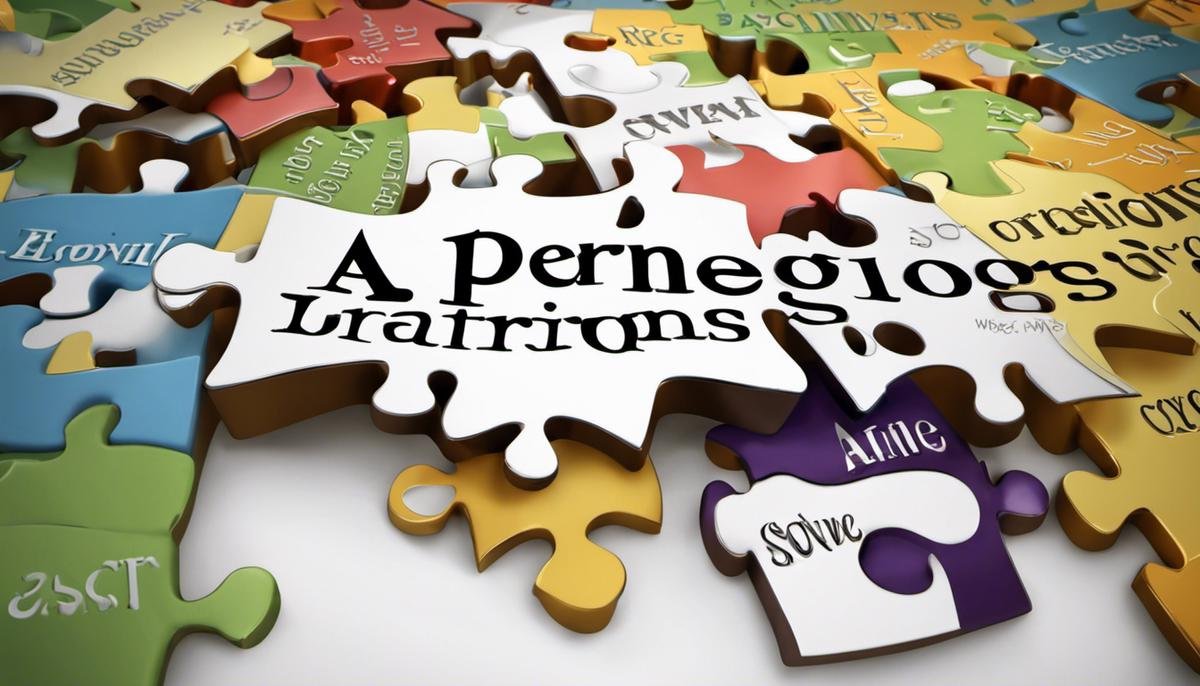
Asperger Syndrome, a developmental disorder characterized by difficulties in social interaction and nonverbal communication, coated with patterns of restricted and repetitive behavior, has often been veiled under misapprehension and clichéd stereotypes. Nevertheless, it embodies a rich variation of individual talents, skills and potential that demand acknowledgment. This discourse provides insight into the inherent aspects of Asperger Syndrome – unveiling its multifaceted character traits, exploring the winding journey of diagnosis, understanding the role of supportive parenting, and realizing the vitality of a compassionate community. The intention is to empower the general public with knowledge, deepen their understanding and equip those directly impacted with useful strategies to navigate the unique pathways of living with Asperger’s.
Identifying Asperger Syndrome
When it comes to raising our little ones, each one of them is indeed a unique masterpiece, right? Sometimes, along with their distinctive traits, there might be a few characteristics that could intimidate you a little and might make you think. It would raise questions like, “Is this normal?” or “Should I be worried?” One such situation is when signs of Asperger Syndrome come into the equation.
Asperger Syndrome, also known as Asperger’s, is a type of pervasive developmental disorder which is characterized by significant difficulties in social interaction and nonverbal communication, alongside restricted and repetitive patterns of behavior and interests. It is an invisible disability meaning you can’t tell that someone has the condition from their outward appearance. After all, aren’t we all dynamic beings still getting to unravel the wonders within us?
So what are the common signs and symptoms of Asperger Syndrome? Let’s dive in and gather some much-needed clarity.
As a word of advice, these signs and symptoms can appear as early as preschool, but they can also suddenly surface when your child enters a new stage in life that demands social acumen.
- Challenges with social skills: The most paramount symptom of Asperger Syndrome is difficulty in social situations. This may include struggle with making friends, awkwardness in group settings, inability to comprehend others’ feelings or emotions, and a strong desire to avoid social interaction.
- Obsession with specific, often unconventional, topics: This might involve voracious interests in very specific topics such as a particular period of history or an unusual hobby. Your budding genius might demonstrate an obsession with facts related to their favorite subject.
- Complexity with changes in routine or environment: Children with Asperger’s often prefer consistency. Any changes in their environment or daily routine might throw them out of sync causing anxiety and frustration.
- Divergent nonverbal communication: One might notice distinctive nonverbal traits. Difficulties with eye contact, unusual body language, or inappropriate gestures can be indicative of Asperger’s.
- Repetitive behaviors: Repetition is another common symptom. This could involve repetitive mannerisms such as hand-wringing or finger twirling, or even a sustained preoccupation with parts of objects.
- Exceptional vocabulary, but monotone in speech: They might use language in an idiosyncratic way or have a fascination with words they love to share but their tone might sound flat or monotonous.
- Physical clumsiness: These kiddos might struggle with motor skills causing clumsiness or awkward movements.
Remember, each child experiencing Asperger’s is completely unique and may present different symptoms. Therefore, it’s essential not to jump to conclusions if you observe a few of these traits in your little one. Diagnosis is a comprehensive process and should be left in the capable hands of a healthcare professional who specializes in this area.
Instead, let’s focus on pouring our energizing love and patience into understanding our children and supporting them in the complex and incredible journey of growing up. It is through understanding and acceptance that we can truly foster a world where our children feel seen, heard, and loved.
Happy parenting!

Photo by anniespratt on Unsplash
Understanding the Diagnosis Process
Moving forward in your journey toward understanding Asperger Syndrome, you may find yourself going through the diagnosis process. This can be a confusing and challenging time for any parent. It is important to reassure yourselves that taking this step shows great courage and a deep love for your child. Rest assured, you don’t have to navigate this path alone. In this article, we’ll explore the diagnostic assessment, how screening tests work, and what you should anticipate during the process.
Asperger Syndrome, like other neurodevelopmental disorders in the autism spectrum, is diagnosed based on behavioral symptoms. Unfortunately, there’s no single medical test, like a blood test, that can diagnose the condition. However, professionals use an assortment of tools – observation, interviews, as well as standardized assessments to make a diagnosis. If you’ve noticed atypical behaviors in your child and your healthcare provider thinks an autism spectrum disorder may be a possibility, they will likely refer your child to a specialist.
The specialists involved in diagnosing Asperger Syndrome can range from neurologists, psychologists, pediatricians, and speech-language pathologists (SLPs), to psychiatrists. Based on your child’s needs, their team may include one or more of these experts. The diagnosis is thorough and evidence-based, taking current behavior, developmental history, and cognitive levels into account. Professionals usually rely on specific criteria outlined in the Diagnostic and Statistical Manual of Mental Disorders (DSM-5), which compiles the known symptoms of Asperger Syndrome under the umbrella term of Autism Spectrum Disorder (ASD).
The process of diagnosis often includes an in-depth interview regarding your child’s development and behaviors that may be out of the ordinary. Specialists will ask about your child’s communication skills, social interactions, and play behaviors. It’s essential to answer these questions honestly and as precisely as possible for the best outcome. At times, you might also be asked to fill out questionnaires that record your perceptions of your child’s behavior. This helps to gather a comprehensive view based on different environments and interactions your child may experience.
Another critical aspect of the diagnostic process is direct observation of your child. Observing your child in various situations and interactions allows professionals to understand the nature of their strengths and weaknesses directly. Assessment scales like The Autism Diagnostic Observation Schedule (ADOS) or The Childhood Autism Rating Scale (CARS) may be utilized in this process.
Do not fear this process, but instead see it as a path towards clarity. The diagnosis process can seem daunting and prolonged, but understanding that it is thorough for a reason can help you navigate it with more confidence. It’s important to remember that a diagnosis does not define your child; instead, it helps in understanding and navigating their world better. The goal is to help position your child for success by identifying their unique needs and accessing resources and support to meet them.
Diagnosis can be a profound experience, and it’s okay to have feelings of relief, confusion, or apprehension. Remember, your feelings are valid, and caring for your mental health is just as important as taking care of your child. Find your support network, connect with other parents who’ve walked a similar path, and don’t hesitate to reach out to professionals for guidance. You are not alone in this journey, and there is a community ready to support and guide you and your family. Your child is unique, special, and has incredible potential – let’s continue to adore, cherish and foster their growth, walking hand in hand with them on their journey.

Living with Asperger’s: Practical Parenting Tips
Let’s dive further into developing practical strategies for raising a child with Asperger Syndrome. Understanding what your child is going through is only half the battle, knowing how to effectively support them is another challenge altogether. Here’a a collection of strategies that have shown to be successful:
- Establish a Routine: A structured routine is especially comforting for a child with Asperger Syndrome. Clearly-defined routines and expectations can lessen anxiety, especially when it comes to everyday activities like meal times, homework, and bedtime.
- Create a Safe Space: A child with Asperger’s often gets overwhelmed by sensory overloads. Create a calm and quiet environment where they can retreat and decompress when it all gets too much.
- Celebrate Smaller Achievements: Children with Asperger’s often obsess over a particular subject and work persistently to conquer it. Celebrate these tiny victories to keep them motivated.
- Foster Social Skills: Encouraging healthy social interaction is important. Role-play and story-telling scenarios can help a child to become more adept at handling various social situations.
- Develop Clear and Open Communication: Remember, a child with Asperger syndrome takes things literally. It’s important to use clear, concise language and avoid phrases which could be confusing or misleading.
- Use Visual Aids: Visual cues help to reinforce instructions or routines. Visual schedules, charts, and stories can be effective tools to provide structure and predictability.
- Encourage Physical Activity: A regular exercise routine can help reduce anxiety and aggression. Consider working with a physical therapist or occupational therapist for a tailored routine.
- Involve them in Decision Making: Giving them some control over their lives can boost their confidence and self-esteem. This practice also enhances their problem-solving and decision-making skills.
- Offer a Balanced Diet: Certain dietary changes, such as gluten-free or casein-free diets, have been reported to have positive effects on children with Asperger’s. It’s important to talk to a nutritionist or healthcare provider before changing your child’s diet.
- Educate Siblings and Peers: It’s crucial for siblings and peers to understand the nature of Asperger Syndrome. Teaching them about the condition and how to interact effectively can go a long way in bridging the gap.
- Find their Passion: Most children with Asperger’s have an intense interest in a specific topic. Nurture this by providing resources and means to explore their area of interest.
Let’s end on an upbeat note. Remember, child is not defined by Asperger Syndrome. They are unique, with their special set of abilities and traits. With patience, understanding, and the right strategies, your child can thrive. So, keep striving, keep learning, and remember – in this journey of parenting, you’re not alone. There are numerous support groups and resources available to navigate these journey with you. Good luck!
Building a Supportive Community
Building a Supportive Community for Your Child with Asperger Syndrome
Any child is a world in themselves, presenting an incredible opportunity to explore, learn, and influence positively. When a child is diagnosed with Asperger Syndrome, it becomes even more critical to remodel our perspectives and build a supportive environment. It is all about accentuating their strengths, providing them with skills to manage their own life and fostering their integration into the community to lead a fulfilling life.
Establishing a routine can be a potent tool for a child with Asperger Syndrome. Predictability eases anxiety and offers them a sense of control. Like a well-worn path, a regular routine becomes an inviting track for these children, guiding them through the day’s activities. It might seem rudimentary, but exceptional results are often born from fundamental habits.
On the journey with your child, creating a safe space becomes quintessential. This sanctuary serves as a haven, where they are free to express themselves without any judgment or pressure. It should be a place that caters to your child’s sensory needs and encourages self-awareness, offering solace in times of overstimulation.
Never underestimate the power of celebrating smaller achievements. Applauding these victories, no matter how trivial they may seem, can boost their self-esteem and encourage them to pursue new challenges. And remember, comedy is the best ice-breaker! Adding humor to situations lightens the mood and develops resilience in your child.
Working on social skills is another cornerstone of building a supportive community. Role-playing various social scenarios with your child, highlighting conversational cues, expressions, and appropriate responses can be incredibly beneficial. It’s about using teachable moments to explain how and why certain responses are expected in social settings.
Clear and open communication plays an instrumental role in this journey. Make sure to express your love and pride in their accomplishments. Simultaneously, when addressing challenging behaviors, it’s essential to be clear, concise, and consistent.
Visual aids can be a favourable friend in their journey to comprehension. Whether it’s a chart illustrating a daily routine or flashcards for teaching expressions, these tools provide a concrete manifestation of abstract ideas, simplifying comprehension for them.
Physical activity has a plethora of benefits — it aids in developing motor skills, reducing stress, boosting mood, and providing an outlet for their surplus energy. Find an activity that your child enjoys and incorporate it into your schedule.
Involvement in decision-making fosters a sense of ownership and boosts their self-esteem. Whether it’s choosing the colour of their room or deciding the menu for dinner, these opportunities to make choices can enhance their decision-making abilities and instilling confidence.
Offering a balanced diet is essential for their overall health and wellbeing. Healthy eating habits can potentially reduce any health-related impediments, ensuring their full potential is met every day.
Educating siblings, peers, and even other adults in their life brings about a better understanding and acceptance of your child’s unique qualities. This education fosters empathy, leading to stronger relationships and a more nurturing environment for your child.
Lastly, discovering your child’s passion and encouraging it can be instrumental in establishing self-esteem and a sense of accomplishment. Whether it’s astronomy, music, or collecting stamps, let them immerse themselves in it. The joy they derive from their interest can translate into real-world skill-building, playing a crucial role in their development.
Building a supportive community is a continuous process, requiring patience, commitment, love, and understanding. Remember, it’s not about comparing your child to others but encouraging them to be the best version of themselves. Every child, including those living with Asperger Syndrome, is capable of enriching the world with their uniqueness. It’s just a matter of providing them the right environment to bloom.

Nurturing a child with Asperger’s extends beyond the cozy confines of a home, it necessitates an empathetic, understanding, and supportive community. Whether it’s in school, the extended family, or even in the neighborhood, inclusive attitudes, supportive gestures, and knowledge about the condition significantly contribute to the child’s growth and self-esteem. In this intersection of compassionate communities and equipped parents, embrace organizations and support groups which serve as lifelines in this journey. They not only provide essential resources but also comfort and strength derived from shared experiences. Remember, a diagnosis of Asperger’s is but a chapter in a book – it does not define the complete story of a person’s life, their extraordinary potentials or limit their prospects for a fulfilled life.





